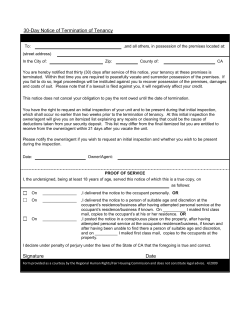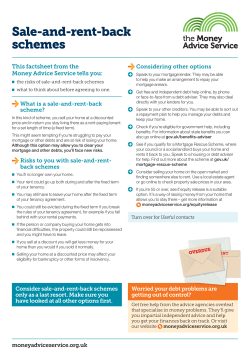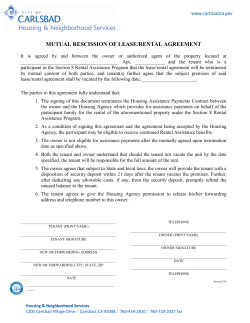
Ending Joint Tenancies and Successions Chesterfield Housing Services • www.chesterfield.gov.uk developed
Ending Joint Tenancies and Successions Issue 1 developed with Tenants Chesterfield BOROUGH COUNCIL Housing Services • www.chesterfield.gov.uk Ending Your Joint Tenancy and Successions Joint Tenancies If you are a joint tenant You should bear in mind that each tenant is jointly and individually liable for the tenancy. This means that you are each fully responsible for meeting the obligations of the tenancy. For instance, you would both be responsible for all of the rent, even if one of you moved out. As long as you remain a joint tenant you are responsible for that tenancy. Any breach of the tenancy agreement is the responsibility of both tenants. In the same way, if one of you signs a termination form ending the tenancy, the whole tenancy will end, even if the other tenant does not know about the form. If you owe rent arrears when the joint tenancy ends, each of you will be responsible for paying them off. In other words, if one person won't pay their share, we will require the other person to pay in full. In the event of one tenant ending the joint tenancy the Council may not offer a sole tenancy to the remaining joint tenant. We will consider future under occupancy of the property, breaches of tenancy conditions eg rent arrears, anti-social behaviour etc. Ending a joint tenancy Ending a joint tenancy is the tenant's responsibility. You should seek independent legal advice. When one of you dies, the remaining spouse or partner can succeed to the tenancy, but only if neither of you had succeeded to it in the first place. (See notes on succession) We recommend that you take independent legal advice from the Citizens Advice Bureau (CAB), Law Centre or solicitor before changing your tenancy. Joint to Sole Tenancy A joint tenancy can become a sole tenancy in the following ways. 1. Through the courts under the Family Law Act 1996, or the Children Act 1989, or (as part of divorce proceedings) the Matrimonial Law Act. 2. In some circumstances one joint tenant can end a joint tenancy and we 1 Ending Your Joint Tenancy and Successions will then grant a new sole tenancy. However, we and all joint tenants must agree to this plan. 3. If the other joint tenant has not lived in the property for over 12 months, you must try your best to contact them and you must tell us where they are. If neither you nor we can make contact with them, we may accept a termination of tenancy from you (as the remaining tenant) and may grant you a new sole tenancy in line with our Allocations Policy. 4. Through the court system via the Family Law Act 1996 or as part of divorce proceedings under the Matrimonial Law Act in a court of law or as part of proceedings under the Children's Act 1989 - we cannot change a joint tenancy, nor take sides in any dispute. If your relationship breaks down, we cannot exclude one joint tenant from the tenancy, nor change the locks to stop a joint tenant getting in. If the relationship does break down, it is very important that you seek independent legal advice as soon as possible. Tenancy Succession What is succession? When a tenant dies, the secure tenancy passes to the tenant's spouse (husband or wife), the tenant's opposite-sex or same-sex partner – or a family member*. This is called succession and the person who gets the tenancy is called the successor. Succession to a tenancy can happen only once. So you cannot be a successor if succession has already occurred. A successor who was not the tenant's spouse must have been living at the property as their only or main home for at least 12 months before the tenant died and be able to provide evidence of this if required. * A family member is defined as the deceased tenant's parent, grandparent, child, grandchild, brother or sister, aunt, uncle, niece, nephew, step relations and half relations (a half relationship is where you are related to someone through your mother or father but not both). A carer cannot be a successor. What if the tenancy was held jointly? If the tenant who dies was a joint tenant, the tenancy continues and remains with the surviving joint tenant provided that person continues to 2 Ending Your Joint Tenancy and Successions live there as their only or main home. This counts as a succession, so when this joint tenant dies, there can be no further succession. What if there are several people who could be the successor? By law, preference always goes to the tenant's spouse or partner if they were living in the home as their only or main home at the time of the death. If there is no spouse or partner and there is more than one family member who could succeed to the tenancy, then the family members must decide between them who will succeed. If they cannot agree, we will decide for them. Can a child be a successor? Yes, a child can succeed to the tenancy but an adult must hold the tenancy on trust until the child reaches the age of 18. Is a new tenancy created when a person succeeds? When a successor takes the tenancy, there is no new tenancy. This is because the successor is taking over the original tenancy automatically under the rules. So the interest in the property and the obligations of the tenancy (that is, both the rights and the responsibilities) pass to the successor. For instance, any rent arrears will still be owed by the successor. What happens if the tenant dies and there is no-one to succeed? If the tenant dies and there is no-one to succeed, the tenancy does not normally end automatically. The executor of the estate (usually the person named as executor in the tenant's will, who deals with their possessions) can give up the tenancy to the Council, but if they don't do this we are not entitled to possession while the tenancy still exists, so the tenancy continues. However, the tenancy will no longer be secure, so we can serve a Notice to Quit on the executor or on the deceased tenant's personal representative if they have taken out probate or letters of administration (these are the legal documents entitling the personal representative to deal with the deceased person's estate). 3 Ending Your Joint Tenancy and Successions If no-one is administering the deceased tenant's estate, the Public Trustee takes over and we can serve notice on the Public Trustee to bring the tenancy to an end. For more on what to do when someone dies, please get advice – your local library, Law Centre or Citizens Advice Bureau may be able to help. What happens if I succeed to the tenancy and the property is larger than I reasonably need? If the tenant dies and you, as a family member, succeed to the tenancy (where there is no spouse or partner to succeed) and we judge the property is larger than you need, then we can, after six months from the date of death, seek possession of the property. We must offer suitable alternative accommodation. We can serve a Notice of Seeking Possession after six months and before 12 months since the tenant's death. If you do not move out and into the alternative accommodation offered, we will apply to the county court for possession of the original property. What happens when the tenant dies and the family member left in the property cannot succeed? When the tenant dies and that tenant was a successor, then the tenancy cannot be succeeded to again. This means that if you were related to or a carer of the deceased tenant and lived in the tenant's home, the tenancy cannot pass to you. We will encourage you to apply for housing for yourself and will consider your circumstances at the time. We will also take into account your relationship to the deceased tenant and the length of time that you lived with them. If the property you were living in is larger than you need, we may offer you smaller accommodation. If we do not offer alternative accommodation we will give you advice and assistance to seek private rented or other accommodation. If you refuse to move out, we may have to take legal action to remove you. If you have any questions about succession or ending a joint tenancy please contact us for advice. 4 Ending Your Joint Tenancy and Successions Housing Solutions Centre Tel: 01246 345700 Chesterfield Law Centre 44 Park Road • Chesterfield • S40 1XZ Tel: 01246 550674 for advice on the telephone Tel: 01246 204570 for advice on the Mincom Email: clc@chesterfieldlawcentre.org.uk Citizens Advice Bureau 6-8 Broad Pavement • Chesterfield • S40 1RP Tel: 01246 209164 for advice on the telephone Email: admin@chesterfieldcab.co.uk Advice is also available online at www.adviceguide.org.uk 5 Council Contacts Customer Services Contact Centre 01246 345345 Reporting Repairs during office hours FREEPHONE 0800 5875659 Repair.Requests@Chesterfield.gov.uk Repairs - Emergency Only (out of hours) 01246 345041 Neighbourhoods Team 01246 345071 Neighbourhoods.Team@Chesterfield.gov.uk Housing Solutions Team 01246 345700 onthemove@Chesterfield.gov.uk ARE WE ACCESSIBLE TO YOU? IF NOT - ASK US! • We want everyone to be able to understand us. • We want everyone to be able to read our written materials. Housing Solutions Team - Staveley Office 01246 345678 onthemove@Chesterfield.gov.uk • We aim to provide what you need for you to read, talk, and write to us. Homelessness Prevention Team 01246 345825 homelessness.prevention@Chesterfield.gov.uk On request we will provide free Homelessness (out of hours) 08456 058058 or 01629 532600 Housing Services Fax 01246 345162 Rents and Rent Recovery 01246 345345 Environmental Services (Bins & Recycling) 01246 345345 Housing & Council Tax Benefit 01246 345345 Text/Voice Messages 07960 910264 Minicom 01246 345285 • Language interpreters, including for sign language. • Translations of written materials into other languages. • Materials in Braille, large print, on tape or Easy Read. Please contact us: Voice Telephone: 01246 345345 Fax: 01246 345252 North Derbyshire Home Improvement Agency (Minor Improvements) 01246 345748/345701 Mobile Text Phone SMS: 07960 910264 Careline (Including Warden Service) 01246 471574 Email: eoinfo@chesterfield.gov.uk
© Copyright 2025
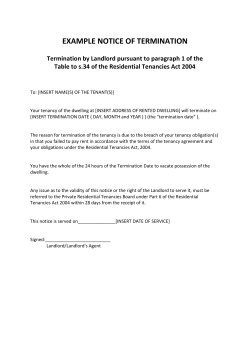

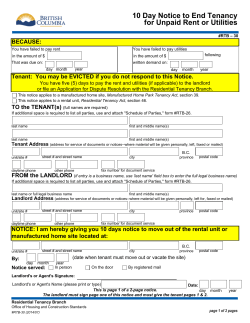
![Sample Letter: Improper Rule Change/Fee or Rent Increase [Date] [Landlord/Manager’s Name]](http://cdn1.abcdocz.com/store/data/000031198_2-6d3ce7b943ede5629a20f08c47060981-250x500.png)

